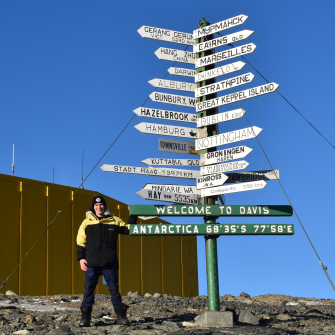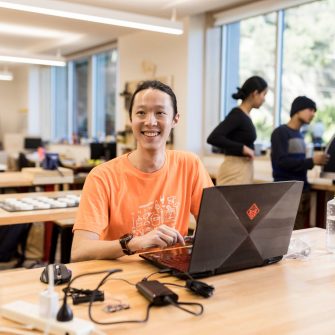Undergraduate Certificate in Computer Science
- Commencing Terms
- Term 1, 2 & 3
- Duration
- 0.7 Year(s)
- Delivery Mode
- Face-to-face (includes blended)
- Campus
-
Kensington
- Codes
- UAC code 425970
- Program code 7022
- CRICOS code -
-
ATAR/2025 lowest selection rank
- 85.0 View all admission criteria
-
2026 Indicative first year full fee
- $4,000*
-
2026 Indicative full fee to complete degree
- $4,000*
-
2026 Indicative first year full fee
- $30,000*
-
2026 Indicative full fee to complete degree
- $30,500*

- Overview
- Entry requirements
- What will I study?
- Future careers
- How to apply
- Fees & Scholarships
Overview
This Undergraduate Certificate in Computer Science is designed for students who aren't able to, or not ready to commit to a full Bachelor’s degree in Computer Science. You can explore the area while undertaking study that will count towards your final degree if you choose to study an undergraduate degree with us. It's also an entry pathway for students into the Bachelor of Computer Science for those who might not have the required ATAR.
Computer Science involves the study of the design, construction and uses of computer systems. It works with the representation of data and data structures in computer systems and the design of algorithms for automatic manipulation of this information by programming languages and machine systems. With computers, information technology and software increasingly underpinning our lives, study in this area will offer you a range of employment opportunities.
Key features
You’ll study at the number one engineering faculty in Australia with leading edge facilities and opportunities for practical hands-on learning.
This program provides you with a solid foundation in Computer Science concepts through four introductory courses. Upon successful completion of this program, you can use it as a pathway into the Bachelor of Science (Computer Science), where your study will be recognised including the courses undertaken in this certificate
The Bachelor of Science (Computer Science) is a three-year, full-time degree that'll give you the skills to shape the computer systems required by individuals and organisations of tomorrow. You’ll graduate with the right knowledge and qualifications to get a job. This degree is accredited by the Australian Computer Society.
You can choose from diverse majors in industry relevant areas including:
- Database Systems
- Programming Languages
- Embedded Systems
- Artificial Intelligence
- Computer Networks
- Security Engineering
Why study at UNSW?
You’ll be studying at Australia’s leading Engineering faculty. We're ranked #1 in Australia and #25 globally for Engineering and Technology, and ranked #4 in Australia for Computer Science. All eight of UNSW's Engineering schools are ranked in the global top 50 with two schools ranked in the global top 10 for Engineering subjects (QS World University Rankings by Subject, 2025).
UNSW’s School of Computer Science and Engineering research is ranked #1 in Australia for Algorithms, Artificial Intelligence, Databases, Embedded & Real-Time Systems and Operating Systems by CS Rankings. Our strong focus on research, with our world-class research facilities feeds leading-edge discoveries straight into our degrees. Our research culture provides an education where you’ll question, test, learn and experiment, making new discoveries along the way.
UNSW is known for its graduate employability, with UNSW awarded the Most Employable students for six years in a row (Australian Financial Review (AFR) Top100 Future Leaders Awards, 2020–2025).
At UNSW Engineering you’ll benefit from a diverse and welcoming community. No matter what your particular interest, engineering or beyond, there’s a club or society for you. UNSW Engineering boasts 16 student societies including a society for each school. Get involved in Queer Students in Stem, Electrical Engineering Society, Women in Renewable Energy Society or Robogals. UNSW’s Women in Engineering (WIE) society runs social and industry events as well as programs designed to mentor and develop female engineers.
When you study engineering at UNSW you can take part in the ChallENG Program. This unique program connects students, academics and industry to exciting, real-world, project-based learning initiatives. The program will prepare you for your future career by helping develop technical and design skills and expanding your professional expertise.
Want to see more from UNSW Engineering?
Entry requirements
Please note that the ATAR will vary depending on the specialisation you choose to study. You can view the required ATAR by visiting the specific page of the specialisation.
-
- The 2025 Lowest Selection Rank (LSR) is the adjusted rank (ATAR plus adjustment factors) you would have needed to gain entry to this degree in 2025.
- The 2025 A levels score is based on four Advanced Level (A2) subjects. Entry scores are calculated from the best three or four A2 subjects (excluding repeated subjects) using the following values: A*=6, A=5, B=4, C=3, D=2, E=1. At most one Applied A Level subject may be included in the best four subjects used to calculate the aggregate.
- The 2025 IB Diploma is an indication of the IB you would have needed to gain entry to this degree in 2025. It is to be used as a guide only.
- The 2025 Lowest ATAR is the lowest ATAR (before adjustment factors were applied) to which an offer was made. Where <5 is listed, this indicates that less than 5 ATAR-based offers were made and so the score has not been published. N/A indicates no offers were made on the basis of ATAR.
*The Lowest ATAR to which an offer was made, for this program, is based on a UNSW Gateway Early Conditional Offer.
-
At UNSW, we are committed to ensuring prospective students have all the information they need in order to make informed decisions about their study options.
To assist you in gaining a better understanding of how Admissions works at UNSW, we have provided you with a summary of ATAR offers and the student profile.
We hope this information will help you identify the degree that is right for you.
Assumed knowledge
Math Extension 1
Adjustment Factors
We offer a range of adjustment factor schemes that reward students for academic performance and extra-curricular achievements. These schemes also take into account a range of personal and educational disadvantages that may have affected your studies.
HSC Plus
This scheme rewards students who perform well in Year 12 subjects that are relevant to their preferred UNSW degree. You may be awarded up to five points.
Elite Athletes, Performers and Leaders (EAPL)
This program recognises achievements in the areas of sport, academia, leadership and music at an elite level. You may be eligible for up to five points.
Educational Access Scheme (EAS)
Factors such as illness, financial hardship, language difficulties or attending a particular school can mean you don't always get the best possible marks in Years 11 and 12. If one of these situations applies to you, submit an application for the Educational Access Scheme (EAS) via UAC. Eligible students can receive between 1 and 10 points towards their chosen UNSW degree.
Admission pathways
This degree is eligible for admission through our Portfolio Entry Early Conditional Offer Scheme. Complete a submission to demonstrate your passion and performance in relevant subjects. Successful applicants will receive an early conditional offer with an adjusted ATAR entry requirement.
English language requirements
You may be asked to provide evidence of your English proficiency to study at UNSW depending on your educational background and citizenship. English language skills are vitally important for coping with lectures, tutorials, assignments and examinations - this is why UNSW requires a minimum English language competency for enrolment.
If you’re completing an Australian Year 12 qualification (e.g. NSW HSC or equivalent), you do not need to provide anything extra to prove your proficiency. Your qualification will be used as evidence of your English proficiency.
If you do need to provide evidence of your English proficiency, this will be indicated in your application. You can prove this by providing evidence that you meet one or more of the following criteria:
- English language tests and university English courses
- Prior study in the medium of English
- Other qualifications
If you need to improve your English skills before you start your degree, UNSW College’s Academic English Programs are for you. The programs are suitable for various English levels and help you prepare for university studies and life in Australia.
For more details, visit the English Language Requirements page.
International direct entry
Information for applicants with CBSE, HKDSE or Singapore A Levels Qualification
Calculating your CBSE Score:
Awarded by CBSE, average percentage marks across English or Hindi, and your best four remaining subjects. Where marks are given as a range, the mid-point for that range is used e.g. 75 to 80 = 77.5.
Calculating your HKDSE Score:
Entry requirements are based on the aggregate of the best 5 achieved category A subjects (category B and C subjects are not considered).
For subjects other than Citizenship and Social Development: level 5**=7 points, level 5*=6 points, level 5=5 points, level 4=4 points, level 3=3 points, level 2=2 points, level 1=1 point, Level U=0 point.
For subject Citizenship and Social Development: Attained=2 points, Unattained=0 point. Citizenship and Social Development will only be counted towards the aggregate if the 2 points awarded for Attained ranks among the student’s best five scoring subjects.
If Mathematics Compulsory Part and Extended Part (Module 1 or 2) are both presented, both scores can be counted.
Calculating your Singapore A Levels:
Due to significant changes to the GCE A-Level Curriculum and University Admissions Score (UAS) calculation effective 2026, UNSW assessment is currently under review.
Note: Entry requirements published on this page are correct as of the day of publication and may change without notice.
We do not accept secondary qualifications from this country. We may accept tertiary study results, please contact us for more information.
Please contact us for direct entry requirements.
Assumed knowledge
Math Extension 1
Adjustment Factors
We offer a range of adjustment factor schemes that reward students for academic performance and extra-curricular achievements. These schemes also take into account a range of personal and educational disadvantages that may have affected your studies.
HSC Plus
This scheme rewards students who perform well in Year 12 subjects that are relevant to their preferred UNSW degree. You may be awarded up to five points.
Elite Athletes, Performers and Leaders (EAPL)
This program recognises achievements in the areas of sport, academia, leadership and music at an elite level. You may be eligible for up to five points.
Educational Access Scheme (EAS)
Factors such as illness, financial hardship, language difficulties or attending a particular school can mean you don't always get the best possible marks in Years 11 and 12. If one of these situations applies to you, submit an application for the Educational Access Scheme (EAS) via UAC. Eligible students can receive between 1 and 10 points towards their chosen UNSW degree.
Admission pathways
If you do not meet the requirements for direct entry into your chosen degree, you may be eligible for a pathway program with UNSW College. UNSW College provides alternative entry options using university-approved content so that you can start your UNSW journey with confidence.
English language requirements
You may be asked to provide evidence of your English proficiency to study at UNSW depending on whether you are from an English-speaking background or non-English speaking background. English language skills are vitally important for coping with lectures, tutorials, assignments and examinations - this is why UNSW requires a minimum English language competency for enrolment.
If English is not your first language, you’ll need to provide proof of your English proficiency before you can be given an offer to study at UNSW. You can do this by providing evidence that you meet one or more of the following criteria:
- English language tests and university English courses
- Prior study in the medium of English
- Other qualifications
If you need to improve your English skills before you start your degree, UNSW College’s Academic English Programs are for you. The programs are suitable for various English levels and help you prepare for university studies and life in Australia.
For more details, visit the English Language Requirements page.
Check the specific English language requirements for this program
What will I study?
UNSW is introducing a new academic calendar from 2028.
We are moving to a new flex-semester calendar. What does this mean for your studies?
Program structure
This program consists of four introductory computer science courses which develops your skills and knowledge in computer systems, programming, mathematics and data structures. Upon completion of this program you will have basic skills and knowledge in computing preparing you for your further studies in the Bachelor of Science (Computer Science).
You’ll study the representation of data and data structures and the design of algorithms for programming languages and machine systems. Personalise your degree by either studying a general Computer Sciences degree or specialise in one of the following in-demand areas:
- Database Systems
- Artificial Intelligence
- Programming Languages
- Computer Networks
- Embedded Systems
- Security Engineering
Full program structure
This program provides you with a solid introduction in computer systems, programming, mathematics and data structures.
In this Undergraduate Certificate in Computer Science you’ll complete four courses. You’ll learn about the fundamentals of programming and computer systems through courses in:
- Programming Fundamentals
- Computer Systems Fundamentals
- Data Structures and Algorithms
This will be complemented by a mathematics course, which provides an understanding of some of the mathematical underpinnings of Computer Science.
When you complete this program you can articulate into an undergraduate degree at UNSW and build a career of the future with a Bachelor of Computer Science. You’ll study the representation of data and data structures and the design of algorithms for programming languages and machine systems.
Personalise your degree by either studying a general Computer Sciences degree or specialise in one of the following in-demand areas:
- Database Systems
- Artificial Intelligence
- Programming Languages
- Computer Networks
- Embedded Systems
- Security Engineering
Future careers
When you graduate from this certificate you are then able to move into a Bachelor of Engineering (Honours). Once completed you’ll be eligible to apply for membership of Engineers Australia. UNSW Engineering graduates are some of the most sought-after engineers in Australia and abroad thanks to the reputation of our teaching.
Your career opportunities will depend on your area of specialisation in your undergraduate degree. From your second year, you can specialise in a particular field of engineering. Visit the various engineering degree specialisations for examples of career opportunities.
How to apply
Applications for undergraduate study from domestic students (Australian citizens, Australian permanent residents, Australian permanent humanitarian visa holders and New Zealand citizens) are processed by the Universities Admissions Centre (UAC).
Visit the Apply section of the UAC website and you can nominate up to five degrees in order of preference, with the first being your most desired degree and university.
On-time applications for admission usually close at the end of September each year for Term 1 admission. Late applications can be submitted, but a late fee will apply. For study starting in Term 1, the majority of offers are made in December and January. Visit the UAC website for key dates for admission outside of Term 1.
Ready to start your application?
For most international students, applications are submitted via our Apply Online service. We encourage you to submit your completed application as early as possible to ensure it will be processed in time for your preferred term.
Some high-demand programs with limited places, may have an earlier application deadline or may have an earlier commencement date. For details, visit the international admissions information page.
*If you are an international student studying an Australian qualification, go to the Universities Admission Centre (UAC) for application and UAC key dates. Note: If you are under 18 years of age, you need to make special arrangements. For details, visit the under 18 international students page.
Ready to start your application?
Fees & Scholarships
Commonwealth Supported Place: Student Contribution Band 2
*The student contribution for a Commonwealth Supported Place is an indication only of the amount payable in Year 1 based on a standard full-time load of 48 credit points (1.0 EFTSL). The actual student contribution you will be liable for depends on your individual program of study and the calendar year in which you enrol. Actual fees are calculated upon enrolment. Student contribution amounts are subject to annual review by the university and may increase each year during your studies (subject to caps determined by the Australian Government), effective at the start of each calendar year.
The indicative fees listed here are based on an estimated average and are for tuition only - other fees and charges are not included.
*Fees are subject to annual review by the University and may increase annually, with the new fees effective from the start of each calendar year. The indicative fees listed here are based on an estimated average and are for tuition only, other fees and charges are not included. The amount you pay will vary depending on the calendar year to enrol, the courses you select and whether your study load is more or less than 1 Equivalent Full Time Student Load (8 courses per year).
Indicative fees are a guide for comparison only based on current conditions and available data. You should not rely on indicative fees. More information on fees can be found at the UNSW fees website.
Indicative fees to complete the program have been calculated based on a percentage increase for every year of the program. Fee increases are assessed annually and may exceed the indicative figures listed here.
Indicative fees to complete the program include tuition plus an estimate of study-related costs of approximately $1,000 per year. To find out more about other costs, visit UNSW International.
Scholarships
At UNSW, we award over $83 million in scholarships each year. We pride ourselves on rewarding excellence and making university accessible to students from all walks of life. Whether you’re a domestic or international student, our range of scholarships, prizes and awards can support your journey.
Featured scholarships
Women in Engineering Scholarships
UNSW provides a wide range of Women in Engineering scholarships to support high-achieving female students throughout their degree.
Apply here and search for ‘Engineering’ in the keywords.
Engineering Rural Scholarship
The Faculty of Engineering Rural Scholarships Program aims to assist high achieving high school students from rural or isolated areas to study in the Faculty of Engineering at UNSW.
Apply here and search for ‘Engineering’ in the keywords.
Progress starts here – at a world-leading university

Top 20 Worldwide
Ranked in the global top 20 for three consecutive years
QS World University Rankings, 2024–2026

Winner of the AFR Most Employable University Award six years in a row
AFR Top100 Future Leaders Awards, 2020–2025

Australia's #1 for Innovation
Highest number of startups and spinouts from university-developed tech
SCOPR report, 2024

The engineering analytic and problem-solving mindset taught by UNSW Engineering is highly desired skillset.




